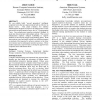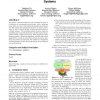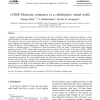1225 search results - page 188 / 245 » Design Principles for Intelligent Environments |
118
click to vote
CHI
2000
ACM
15 years 6 months ago
2000
ACM
We can reliably build “second generation” intelligent computer tutors that are approximately half as effective as human tutors. This paper evaluates two interface enhancements...
126
click to vote
ATAL
2010
Springer
15 years 3 months ago
2010
Springer
We present a formal framework of an autonomous agent as a collection of coordinated control loops, with a recurring sense, plan, act cycle. Our framework manages the information f...
117
click to vote
AI
2005
Springer
15 years 2 months ago
2005
Springer
A theoretical framework for grounding language is introduced that provides a computational path from sensing and motor action to words and speech acts. The approach combines conce...
144
click to vote
ECRA
2002
15 years 2 months ago
2002
Existing e-commerce applications on the web provide the users a relatively simple, browser-based interface to access available products. Customers are not provided with the same s...
148
click to vote
ATAL
2007
Springer
15 years 8 months ago
2007
Springer
Intelligent agents that are intended to work in dynamic environments must be able to gracefully handle unsuccessful tasks and plans. In addition, such agents should be able to mak...



